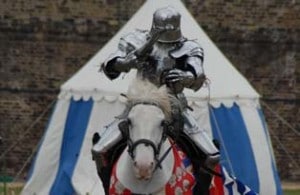 On the 24th January 1536 the 44 year old King Henry VIII had a serious jousting accident at Greenwich Palace. Eustace Chapuys, the imperial ambassador, reported it in his dispatches, writing:-
On the 24th January 1536 the 44 year old King Henry VIII had a serious jousting accident at Greenwich Palace. Eustace Chapuys, the imperial ambassador, reported it in his dispatches, writing:-
“On the eve of the Conversion of St. Paul, the King being mounted on a great horse to run at the lists, both fell so heavily that every one thought it a miracle he was not killed, but he sustained no injury. Thinks he might ask of fortune for what greater misfortune he is reserved, like the other tyrant who escaped from the fall of the house, in which all the rest were smothered, and soon after died.”
By the way, I do like Chapuys’s rather cutting remark about Henry’s fate!
Dr Ortiz also recorded the accident in a letter to the Empress:-
“The French king said that the king of England had fallen from his horse, and been for two hours without speaking. “La Ana” was so upset that she miscarried of a son.”
As Suzannah Lipscomb points out in her book “1536: The Year that Changed Henry VIII”, “the speed of the gallop at the charge, his heavy armour, the height of Henry’s great horse (and weight, if the large, mailed animal fell on him) and the blow of his opponent’s lance combined to make this a very serious accident.” The King obviously had a huge blow to the head, but it could have obviously been so much worse.
In my article on the accident last year – see Henry VIII’s Jousting Accident – 24th January 1536 – I explored the possible impact this accident had on Henry, his family and also his reign, so do read that article for further information.
Notes and Sources
- LP x.200, Chapuys to Granvelle
- LP x.427, Dr Ortiz to the Empress
- 1536: The Year that Changed Henry VIII, Suzannah Lipscomb, p58
Also on this day in history…
- 1503 – The foundation stone of King Henry VII’s chapel was laid at Westminster Abbey (Thank you to Paul Wiltshire for this fact)
- 1555 – A great joust was held at Westminster between English and the Spanish knights – “grett ronnying at the tylt at Westmynster, with spayrer, boyth Englys men and Spaneards”